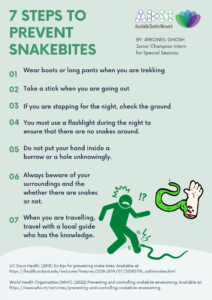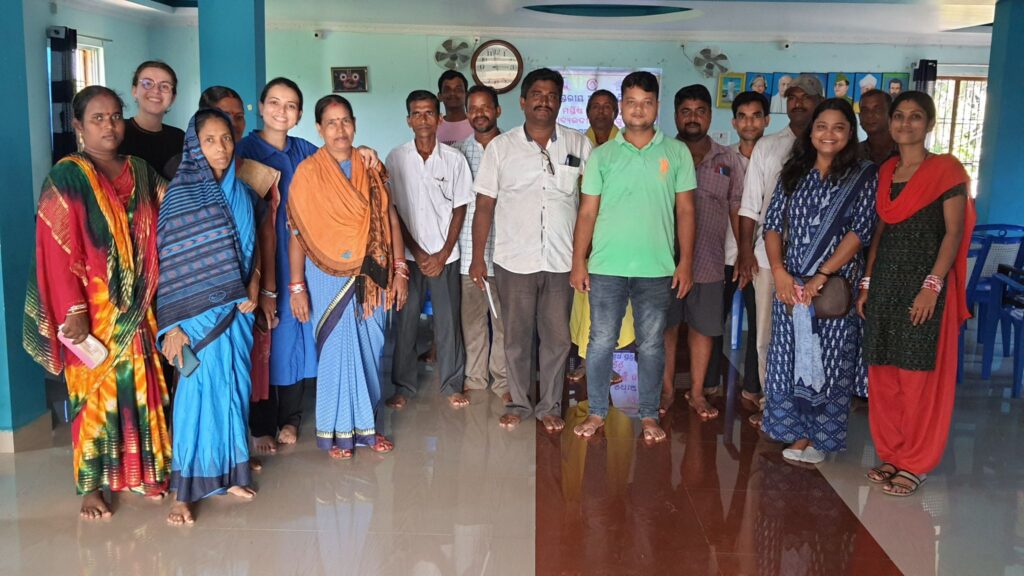November 2020 to September 2022 – Avoidable Deaths from Snakebites during Disasters in Odisha, India
Snakebite, or snakebite envenoming, is a neglected tropical disease (NTD) which results from the injection of venom, a specialized toxic secretion, into humans by the bite of a venomous snake. It is responsible for between 8,100-138,000 deaths globally each year and affects as many as 2.7 million people each year (Longbottom et al., 2018; Williams et al., 2019). It has been estimated that the burden of premature death as a consequence from snakebite is 6.07 disability-adjusted life years (DALYs) (Gutiérrez et al., 2017). Unlike many other diseases, snakebite is entirely preventable and treatable through education, access to antivenoms, trained health workers, and effective governance (among other measures).
India accounts for approximately half of all global snakebite deaths reported through traditional surveillance systems, and is responsible for 2.97 million DALYs. Around 70% of deaths occur in eight states with over half of the total Indian population: Bihar, Jharkhand, Madhya Pradesh, Odisha, Uttar Pradesh, Andhra Pradesh (including Telangana), Rajasthan and Gujarat. ADN’s India Hub is located in Odisha. In 2020, after flood related deaths, snakebites were the major cause of deaths. To understand the cause and circumstances that lead to snakebite deaths during disasters, this research project was initiated to:
- Investigate the complex micro-interactions between various systems at work including gender and the cause of high-risk areas to understand the true burden of snakebite deaths in Odisha.
- Explore the cause and circumstances leading to avoidable snakebite deaths during disasters in Odisha.
- Identify localised risk governance that can potentially lead to reducing snakebite deaths in Odisha.
Updates:
20 December 2022: Following the successful application to the Leicester Institute for Advanced Studies, the project entitled ‘Exploring the Feasibility and Value of Pioneering Partnerships to Reduce Avoidable Snakebite Deaths in India’ has been accepted and will commence on 6 January 2022.

30 September 2022: Dr. Nibedita Ray-Bennett submitted the project proposal entitled ‘Exploring the Feasibility and Value of Pioneering Partnerships to Reduce Avoidable Snakebite Deaths in India’ to the Leicester Institute for Advanced Studies in collaboration with 22 organisations.
MSc student, Ms. Nimisha Goswami submitter her dissertation to the University of Leicester.
A hybrid Special Session on International Snakebite Awareness Day: Challenges and Opportunities to Reduce Avoidable Snakebite Deaths in Odisha/ India was hosted at the ADN Hub India in Odisha. Future Leader Ms. Nimisha Goswami shared her MSc dissertation findings in a presentation on ‘Understanding causes and circumstances of snakebite-related mortalities among the disaster-affected communities in Odisha, India’. Junior Champion Intern for Special Sessions, Mr. Arkoneil Ghosh presented his poster on ‘7 Steps to Prevent Snakebites’.
25 – 30 July 2022: MSc student Ms. Nimisha Goswami conducted fieldwork in Odisha, India.

1 February 2022 – 30 September 2022: Research on understanding the community perspectives and causes and circumstances leading to snakebite related deaths is currently being carried out by Ms Nimisha Goswami, student of the MSc Risk Crisis and Disaster Management, University of Leicester under the supervision of Dr Nibedita Ray-Bennett.
30 January 2022: Dr Nibedita Ray-Bennett submitted an application to the United Nations Office for Disaster Risk Reduction’s Global Platform’s Side Event, which aimed at raising the visibility of snakebite deaths during disasters. Collaborating partner was Mr Gowri Shankar (Kalinga Centre for Rainforest Ecology).
1 September 2020 – 20 February 2021: A literature review on snakebite deaths in Odisha has been conducted, and the districts vulnerable to snakebite deaths have been identified.
21 October 2020: Dr Nibedita Ray-Bennett met with the Indian Council of Medical Research, Zoological Survey of India, Sheffield University, Leicester’s National Centre for Earth Observation, the Orissa State Volunteers and Social Workers Association and the Kalinga Centre for Rainforest Ecology to explore the scope of collaborating for this project.

